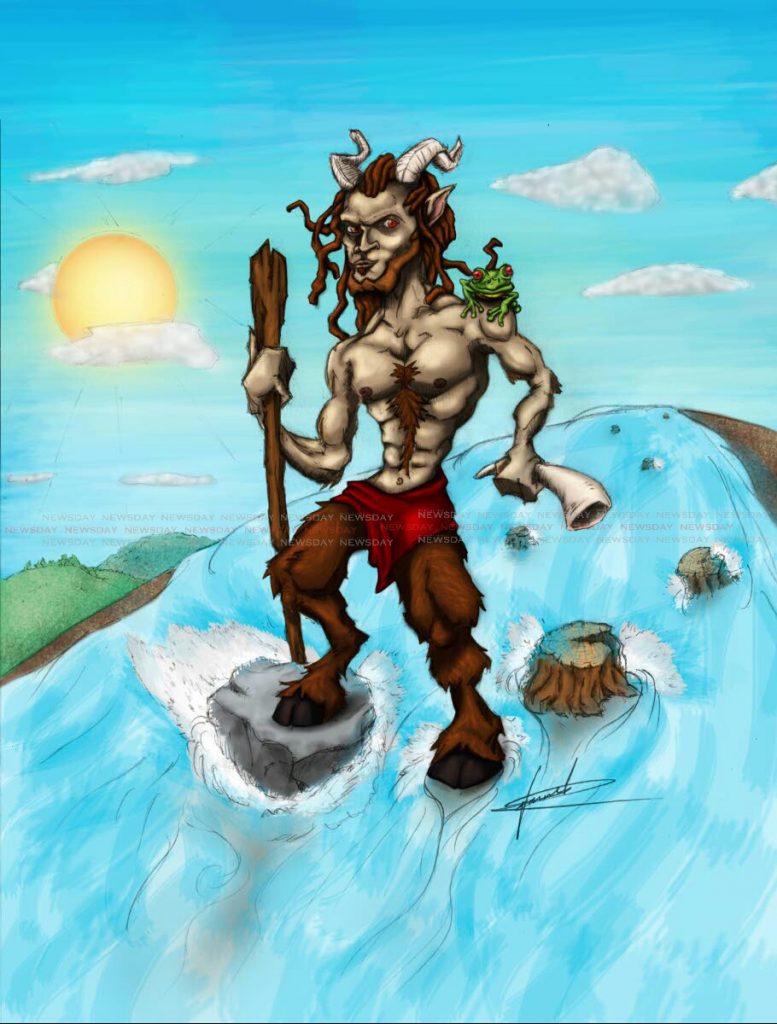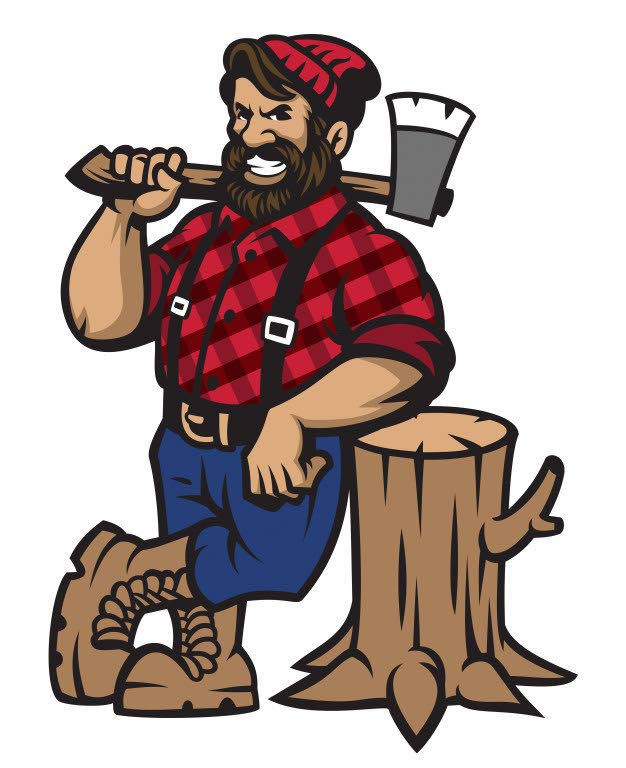Papa Bois and the Lumber Jacks

At the request of his six-year-old son, Zion, reporter JENSEN LA VENDE wrote this story and eventually posted it on Facebook. It caught the attention of the staff at Malick Secondary School, who extended an invitation to La Vende to do a special reading for the students there.
One day while walking through the Aripo forest, Papa Bois was stopped by a flock of birds. Some he recognised from dropping off berries for him, others he just knew them by their songs but hadn’t met them before. The birds, flustered and dusty, were upset, some angry. A few were dazed and chirped in a confused note.
“We are tired Pa!” cried Woodlet, a teenage woodpecker. “We know you said we must live at peace with the humans but our homes are being taken away”.
Manchild the monkey came wobbling as the birds complained about the humans. He added to the list of things the humans were doing. He showed his left leg with holes in them from a trap set to catch monkeys. It was hunting season and while some animals sacrificed themselves as they neared death, the increased lumber jack’s meant more food, which meant more sacrifices and less time to restore the balance.
Pa, as the animals called him, listened as animal after animal came and told him about their hardships and how the increased men in the forest was affecting them. He began his journey to the waterfalls cheerful and arrived heartbroken. Not even the warm water from his wife Mama D’lo soothed him. He was troubled, but more so, he was angry.
 Papa Bois knew that humans were selfish creatures and wilder than any animal he met, but he never thought they’d harm themselves. He had a good relationship with one of the villagers so he decided, before he chased the humans away, he’d have a chat with his friend Sunil. Sunil was a skilled hunter, tall, slim, strong, soft spoken, but a chatter box. He told the village that the animals would put themselves in human traps when they realised it was their time to die.
Papa Bois knew that humans were selfish creatures and wilder than any animal he met, but he never thought they’d harm themselves. He had a good relationship with one of the villagers so he decided, before he chased the humans away, he’d have a chat with his friend Sunil. Sunil was a skilled hunter, tall, slim, strong, soft spoken, but a chatter box. He told the village that the animals would put themselves in human traps when they realised it was their time to die.
He told the villagers where the purest part of the river was. He told them about the best way to trap the birds for their cages and how to make them sing, even when captured. He learnt all of that from Papa Bois. Papa Bois knew he shared their secrets but trusted him above all other humans. Sunil respected Papa Bois and Papa Bois loved him for it.
The two met at their secret spot near the mouth of the Aripo caves. It was there they met many years earlier when Papa Bois first arrived to the area and when Sunil, still a teen, was separated from his hunting party and got lost. The two helped each other to find their way out of a dark place. When the search party was nearing the cave, Sunil hid Papa Bois and in return was rewarded with the fattest quenk ever seen. Since that day they would meet often and chat. Sunil would let the village know what Pa expected of them and in return Pa left them alone.
Pa tried to cheer himself up before the meeting, it was the first in several months, Sunil’s wife just had a baby boy and he stayed away from the forest for a while. The last thing Papa Bois needed was to greet his friend with sorrow. Sunil didn’t care, he knew the forest was in pain. He felt it. The winds spoke to him every night letting him know that the forest was about to reclaim it’s superiority over the mortal men. He knew the animals hid further in the forest and food was harder to come by. He knew he had to make peace.
“Pa” he started, “our friendship hard like the bois bande tree, yes?”
With a confused look, Papa Bois answered, “of course! Yuh know if I used to eat humans you would be my favourite meal,” Pa tried nervously to lighten the mood with his joke. Sunil gave him a chuckle and beneath his breath muttered, “you really want to kill all ah we ent?”
At this time the wind blew and Papa Bois heard some of the things it told Sunil. They both felt like crying. They didn’t and instead the wondered how they would get revenge. First Papa Bois said he’d chase them out of the area, but he recalled his promise to live in harmony with humans and not isolation.
The lumber jacks cleared a space out of the forest to set up their base. The went higher and higher in the mountains and took more and more trees. Leaving animals without homes and in some cases, parents or offspring were killed in the process. Papa Bois understood that humans needed meat from the animals so he allowed hunting, but the jacks killed animals not for food, but for money.
 Both Sunil and Papa Bois decided to seek assistance for the plan they hatched. Mama D’lo was needed. In the night, when all the lumber jacks slept, she let loose her waters over the land. With no trees to absorb the water, what was a hilly, half naked mountain top, turned to a wave of mud. Sunil slipped out his home and rang the village bell alerting them to the danger. The lumber jack’s came out of their huts and saw the muddy mountain about to swallow them. They grabbed what little they could while waking each other up and ran out the way. They stood and looked on in horror as all their belongings washed away. Equipment used to log tree trunks away was now like garnish on a meal, sprinkled in between the mud. Nothing remained. The villagers and lumber jacks were confused, there was no rain. The slip was expected, but not without rain and not without them making loads of money.
Both Sunil and Papa Bois decided to seek assistance for the plan they hatched. Mama D’lo was needed. In the night, when all the lumber jacks slept, she let loose her waters over the land. With no trees to absorb the water, what was a hilly, half naked mountain top, turned to a wave of mud. Sunil slipped out his home and rang the village bell alerting them to the danger. The lumber jack’s came out of their huts and saw the muddy mountain about to swallow them. They grabbed what little they could while waking each other up and ran out the way. They stood and looked on in horror as all their belongings washed away. Equipment used to log tree trunks away was now like garnish on a meal, sprinkled in between the mud. Nothing remained. The villagers and lumber jacks were confused, there was no rain. The slip was expected, but not without rain and not without them making loads of money.
The company decided to abandon the project because restarting was too expensive. Soon talk spread to the other towns about the rainless landslide. The older folks knew it was Papa Bois protecting the forest while the younger ones thought it was old obeah. Whatever the cause, the press found out, soon the government was involved. No one had applied to cut trees in the area so it was an illegal mill. To ensure it never happened again, the government granted a protection order for the Aripo forest.
Sunil was forced to move out the village as work dried up. The cave became exposed, but Pa no longer cared about being seen. He needed all to know, especially the humans, that when they destroy the homes of animals, they are destroying themselves. To this day, no one dares pick a leaf in that forest without either asking permission, and if they do, they usually return and beg for forgiveness.

Comments
"Papa Bois and the Lumber Jacks"